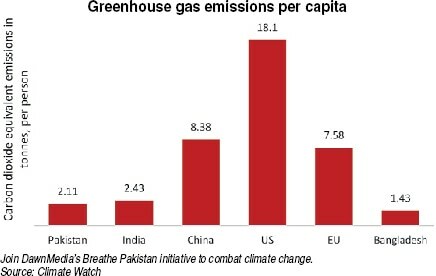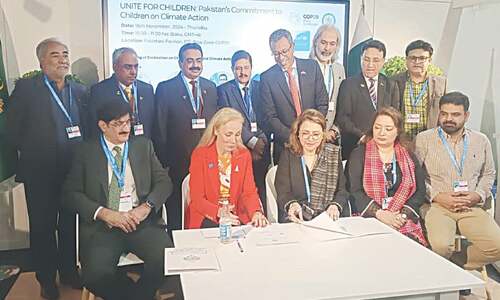ROMINA Khurshid Alam, the PM’s aide on climate change, has called for integrating disaster risk finance into its loss and damage efforts as a step towards resilience and long-term recovery and managing the escalating costs of climate change.
Speaking at an event titled ‘Pakistan and Global Shield’ at the Pakistan Pavilion on Wednesday, Ms Alam said extreme weather events, rising sea levels, and prolonged droughts underlined the urgent need for climate-vulnerable developing countries to formulate comprehensive strategies to address loss and damage.
“Integrating disaster risk financing into loss and damage efforts represents a proactive approach to managing the escalating costs of climate change. By combining innovative financial tools with inclusive, data-driven strategies, the governments and global partners can mitigate climate risks, support recovery, and foster resilience,” Ms Alam said. “Collaborative action today will safeguard communities and ecosystems for a more secure and equitable future.”
According to the PM’s aide, they explored the pressing gaps in pre-arranged financial protection —particularly in public infrastructure, agricultural livelihoods, and small businesses — and how the ‘Global Shield’ can bring unique value by aligning development efforts, fostering a country-led process, and leveraging pre-arranged financing instruments.
Subpar performance lowers country’s CCPI ranking
“…Pakistan’s approach serves as a model for integrating disaster risk financing into broader loss and damage efforts. This comprehensive, data-informed, and inclusive process sets an inspiring precedent for other climate-vulnerable nations,” she remarked.
Climate Change Secretary Aisha Moriani said the costs of most large-scale natural disasters were retained in the government books and only a few disaster-risk insurance or non-insurance instruments are present. “Unfortunately, insurance penetration, which could be crucial in mitigating financial losses, remains limited, and is less than 1pc of the country’s GDP,” she added.
Hamza Haroon, the Climate Vulnerable Forum Vulnerable 20 (CVF-V20) South Asia regional director, underscored the critical importance of addressing the needs of the most vulnerable communities in Pakistan through disaster insurance. “Introducing climate insurance products for disaster-vulnerable communities, their livelihoods and infrastructure is a cornerstone of policy efforts and programmes being taken by the Pakistani government for building climate resilience,” he said.
Mr Haroon suggested, “Engaging with insurance companies to introduce different disaster insurance plans for vulnerable communities and sectors will be a crucial step by the different relevant government organisations.”
Joerg Linke from GIZ Competence Centre Climate showcased the transformative potential of shock-responsive social protection systems that can be scaled up in Pakistan for climate-vulnerable communities.
Decline in CCPI ranking
On the sidelines of COP29, a report on the annual Climate Change Performance Index (CCPI), 2025 showed Pakistan down by one point to the 31st position due to high greenhouse gas emissions and energy use and subpar performance in climate policy and clean energy transition.
The index has been developed by Germanwatch as a tool to increase transparency in international climate change policy, according to its website.
The CCPI report pointed out Pakistan ranked high in GHG emissions, low in international and national climate policy; and very low in the renewable energy transition.
According to its revised Nationally Determined Contribution (NDC) submitted in 2021, Pakistan needs to reduce emissions by 15pc by 2030 and increase renewable energy to 60pc of the energy mix by 2030. In order to meet this clean energy target, which required nearly $100 billion, the country would need increased investments in infrastructure and policy reforms.
The report urged Pakistan to plan a fossil fuel phase-out, implement more renewable energy projects, and improve monitoring and enforcement mechanisms for national climate policies.
“In 2012, the country decided on its National Climate Change Policy. This framework addresses Pakistan’s vulnerability to the climate crisis and includes adaptation measures for sectors such as water, agriculture, and biodiversity,” it said.
The report said renewable energy continued to account for a low share of the energy mix at 7pc as the country “still heavily relies on fossil fuels” push towards reliance on imported LNG could hinder a clean energy transition.
According to the report, Denmark being the best performer was at the fourth spot — the first three spots were empty because none of the countries could do enough to top the ranking — whereas Russia, Iran, Saudi Arabia, and the UAE were at the bottom with renewable energy mix below 3pc.
Published in Dawn, November 21st, 2024















































Dear visitor, the comments section is undergoing an overhaul and will return soon.